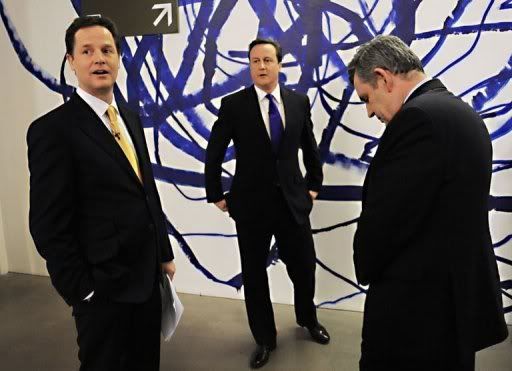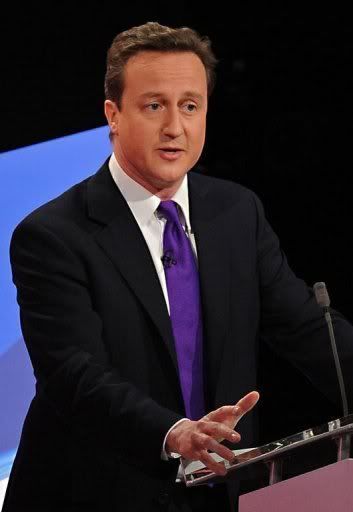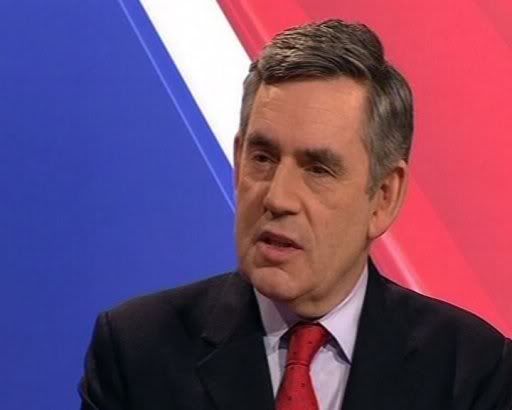
Nick Clegg (L), David Cameron (C), and Gordon Brown
Britain's election race tightened after the second party leaders' TV debate failed to produce a runaway winner, increasing the chances of a hung parliament.
Prime Minister Gordon Brown clashed Thursday with Conservative leader David Cameron and Liberal Democrat leader Nick Clegg on issues ranging from Britain's nuclear deterrent to its role in Europe.
All eyes were on Clegg to see if he could outshine his opponents as he did in the first debate last week, which propelled his party from its traditional third position in polls into second, and sometimes even first, place.

David Cameron

Gordon Brown participates in the second of three live televised debates.Second debate for party leaders as election race hots up.
Instant polls taken after the clash gave the Lib Dem leader a slim margin of victory over Cameron. But the parties were close and the result suggested Britain was headed for a tight three-way race in the May 6 general election.
The results appeared to increase the likelihood that the vote would produce Britain's first hung parliament -- where no party has an overall majority -- since 1974.
The leaders appeared more at ease than in the first US-style televised debate last week, and were quick to begin trading blows.
Brown, of the ruling Labour Party, accused his opponents of leaving Britain poorly defended against nuclear attack and at risk of isolation in Europe.
"Nick, you will leave us weak, David you will leave us isolated in Europe," Brown said.
In a rare moment of agreement during Thursday's debate on Sky News television, Brown and Cameron joined forces to attack the Liberal Democrat leader's opposition to renewing Britain's Trident nuclear missile programme.
Brown said: "I say to you Nick 'get real, get real' because Iran, you are saying, might be able to have a nuclear weapon and you wouldn't take action against them."
"Get real about the danger that we face if we have North Korea, Iran and other countries with nuclear weapons," he added.
Clegg criticised both the government's and the main opposition's plans to spend money on replacing a "Cold War nuclear missile system."
To laughs from the audience, Cameron said: "I have never uttered these words but 'I agree with Gordon'."
The leaders also clashed over Europe, with Brown and the Lib Dem leader attacking Cameron for his decision to withdraw his party's European lawmakers from the centre-right European People's Party.
The prime minister accused Cameron of aligning himself with "right-wing extremists", while Clegg said the Tory leader was working with "nutters, anti-Semites."
Cameron however claimed both his opponents had let Brussels take too many powers away from London without any sort of consultation.
"What you are hearing from the other two is, frankly, do not trust the people," he said.
"Do not ask them when you pass powers from Westminster to Brussels."
The leaders were also asked directly if they thought a coalition government -- which would be the outcome of a hung parliament -- was the way forward for Britain.
Clegg, who could hold the balance of power if no one party has an overall majority, spoke positively of such an outcome.
"People are beginning to hope that we can do something different this time," he told the audience.
Cameron reiterated his view that it would be a bad result, saying: "I think we do need decisive government to take some of the difficult decisions for the long term."
Clegg dismissed as "rubbish" accusations of wrongdoing after a story in the Daily Telegraph paper revealed that three businessmen paid up to 250 pounds a month into his bank account in 2006, a year before he became party leader.
A series of instant polls taken after the clash indicated the poll battle would be tight.
An average of five surveys gave Clegg a slight lead -- on 33.8 percent -- but only slightly ahead of Cameron, who was on 32.8 percent.
Brown meanwhile scored 27.6 percent.
Meanwhile, a crowd of some 150 protesters gathered outside the debate venue in Bristol, southwest England, and police made six arrests for public order offences.
The demonstrators were from a range of groups, including anti-war demonstrators and pro-Palestine campaigners.






0 comments:
Post a Comment